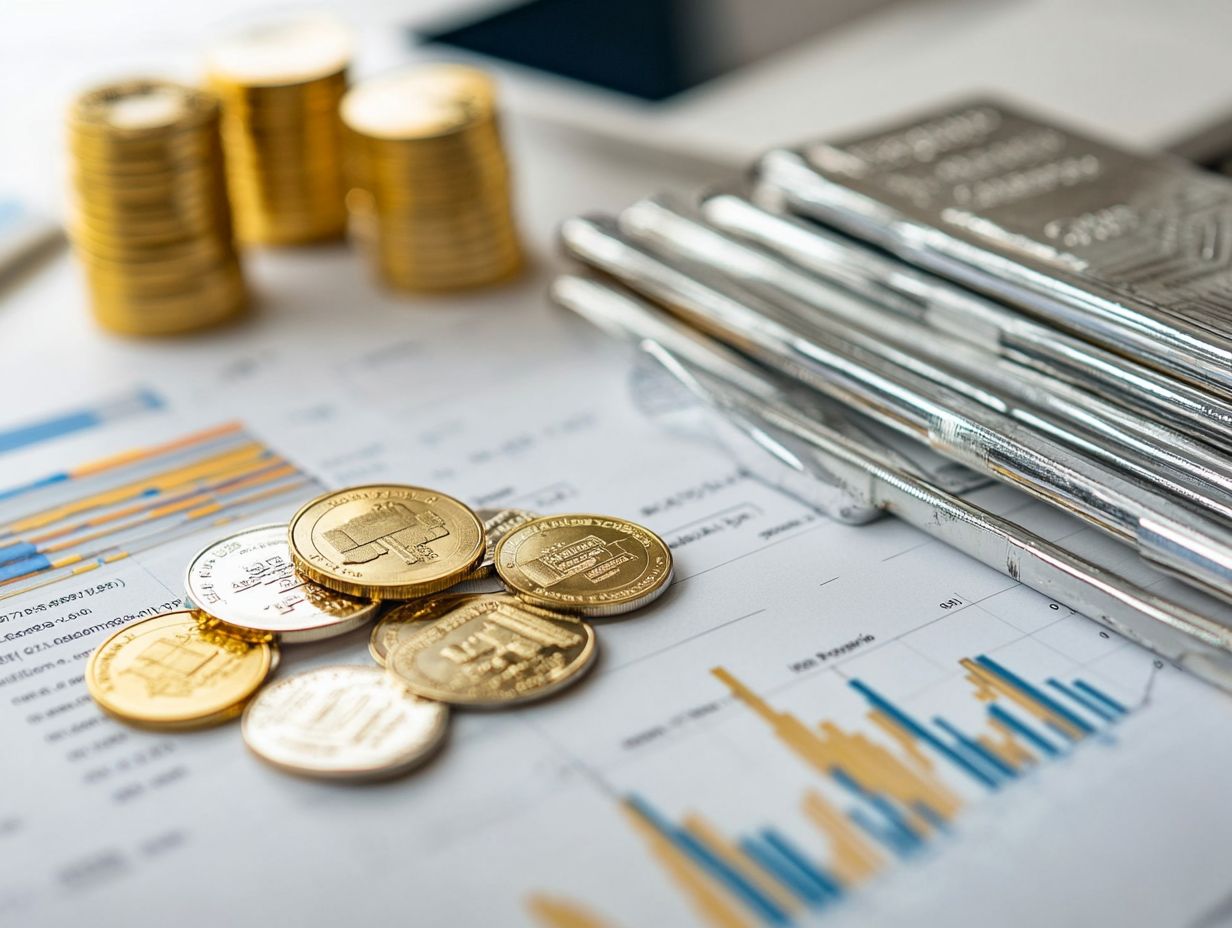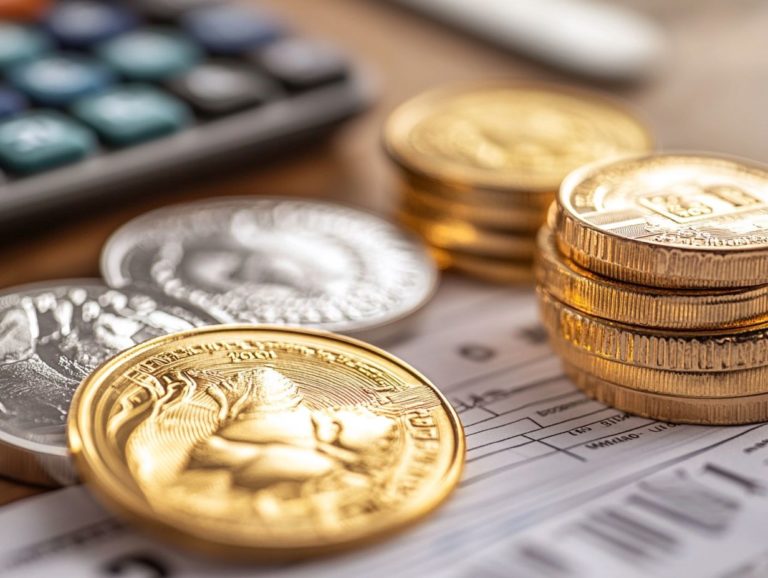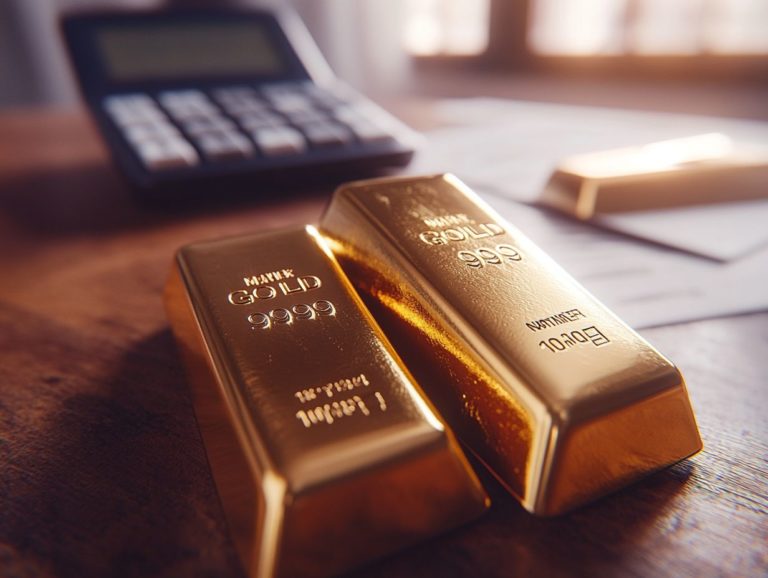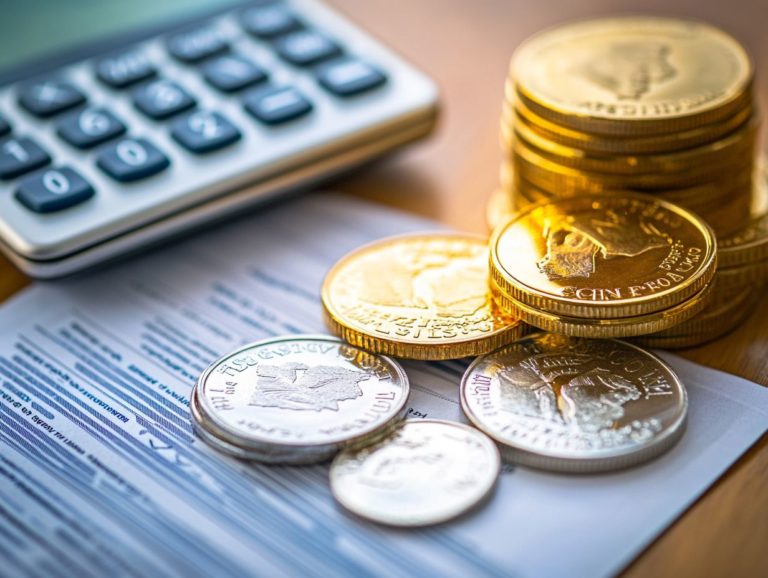Strategies for Minimizing Taxes on Precious Metals Gains
Navigating the tax landscape for precious metals can feel intricate, but grasping your obligations and opportunities is crucial for any savvy investor like you. Understanding these tax implications is not just important; it’s crucial to your financial success!
This article delves into the different taxes applicable to precious metals, offering effective strategies to minimize your tax liability and insights on the optimal timing for sales to maximize your benefits. Get ready to take control of your investments!
It covers how to capitalize on available deductions and provides guidance on tax planning for inherited metals.
Contents
- Key Takeaways:
- Understanding Taxes on Precious Metals
- Minimizing Taxes on Precious Metals Gains
- Timing Your Sales for Tax Benefits
- Maximizing Tax Deductions for Precious Metals Investments
- Tax Planning for Inherited Precious Metals
- Frequently Asked Questions
- What are some strategies for minimizing taxes on precious metals gains?
- How does holding onto precious metals for at least one year help minimize taxes?
- Can I deduct losses from precious metals investments on my taxes?
- What is a tax-advantaged retirement account and how can it help with minimizing taxes on precious metals gains?
- Are there any specific tax breaks for investing in precious metals?
- Do I need to pay taxes on precious metals that I inherit?
Key Takeaways:

- Be aware of the types of taxes on precious metals, such as tax on profits from selling assets and income tax, to better understand how they can impact your gains.
- Consider strategies such as tax-loss harvesting and holding investments for over a year to minimize your tax liability on precious metals gains.
- Timing your sales strategically, based on factors such as market conditions and income level, can help maximize tax benefits and minimize taxes on precious metals.
Understanding Taxes on Precious Metals
Understanding the taxes on precious metals like gold and silver is essential for you as an investor aiming to grow your wealth while staying compliant with IRS regulations. Precious metals are frequently regarded as safe-haven assets, but just like any investment, they come with tax on profits from selling assets that can heavily influence your profitability.
You need to be aware of how fluctuations in market value can impact your tax liability, as both profits from assets sold within a year and long-term capital gains tax rates come into play depending on how long you hold your investment.
This guide will clarify the various tax implications associated with precious metal investments, enabling you to make well-informed financial choices.
Types of Taxes on Precious Metals
When you re diving into the world of investing in precious metals like gold and silver, grasping the various types of taxes tax on profits from selling assets being a primary concern is crucial for effective tax planning and refining your investment strategies.
This knowledge becomes particularly important when distinguishing between short-term and long-term capital gains, as these classifications can significantly influence your net returns. Short-term capital gains, which come from assets sold within a year, are taxed at ordinary income tax rates that can be quite steep. On the flip side, long-term capital gains stem from investments held longer than a year and enjoy lower tax rates, making them a more favorable choice for strategic investing.
It s also essential to remember that collectibles, such as valuable coins or artwork, might attract even higher tax rates, adding complexity to your overall tax liability. Understanding these distinctions is vital for you as an investor aiming to optimize your financial outcomes.
Minimizing Taxes on Precious Metals Gains
Minimizing taxes on gains from your precious metals investments demands careful tax planning and strategic investment approaches. To effectively navigate these complexities, it’s advisable to seek a qualified financial advisor.
Their guidance can prove invaluable in optimizing your investment outcomes while ensuring compliance with tax regulations.
Strategies for Reducing Tax Liability

Implementing effective strategies to reduce tax liability on precious metals investments can significantly enhance your overall profitability, and many savvy investors find it advantageous to consult with a financial advisor.
By exploring options like exchange-traded funds (ETFs) or mutual funds that focus on precious metals, you can gain valuable exposure while potentially enjoying tax efficiencies. Understanding the intricacies of a 1031 exchange, a strategy that allows you to swap one investment property for another without paying taxes right away, can also offer you tax deferral advantages.
These approaches not only help optimize your returns but also contribute to a more strategic way of managing your wealth, aligning your investment choices with your long-term financial goals.
Such comprehensive strategies can enable you to navigate the complexities of taxes while maximizing the potential of your precious metals portfolio.
Timing Your Sales for Tax Benefits
Timing your sales of precious metals can greatly affect your tax benefits. Both short-term and long-term capital gains taxes apply, depending on when you choose to sell your investment assets.
Being strategic about your sale can lead to more favorable tax outcomes.
Key Considerations for Timing Sales
When considering the timing of your sales of precious metals, keep a few key factors in mind. Monitoring market value is essential, as is understanding the impact of the tax you pay on profits from selling investments. Assessing your overall investment profits will help you make informed decisions.
It’s also important to consider current economic conditions like inflation rates and geopolitical stability since these can significantly influence precious metal prices. Your personal financial situation matters too. If you’re facing financial challenges, you might need to liquidate assets for immediate cash flow. Conversely, if you’re in a stable position, you may prefer to hold onto your investments for potential future gains.
Don’t overlook potential future tax implications. Changes in legislation could impact your net profits from sales. Staying informed about evolving tax regulations and market trends is key for savvy selling.
Maximizing Tax Deductions for Precious Metals Investments
Maximizing tax deductions for your precious metals investments is a smart strategy that can significantly lower your overall tax liability. Understanding the available deductions is crucial for optimizing your financial outcomes.
Available Deductions and How to Claim Them

As an investor in precious metals, it s important to know the deductions available to help offset taxes on your investment profits. This includes specific expenses recognized by the IRS.
These deductions can cover costs such as storage, insurance, and even fees incurred while buying or selling these valuable assets. To claim these deductions effectively, keep meticulous records of all related transactions and expenses throughout the year.
Start by organizing your receipts and invoices, categorizing them by type to simplify the tax return process. Next, consult the IRS guidelines on qualifying deductions for precious metal investments. Ensure every entry on your tax forms matches your records to substantiate your claims, making the entire process smoother and more efficient.
Tax Planning for Inherited Precious Metals
Navigating tax planning for inherited precious metals can be complex, especially when it comes to understanding the tax implications of receiving gold or silver through inheritance. Seeking the guidance of a knowledgeable financial advisor is often essential to make informed decisions.
Options for Minimizing Taxes on Inherited Metals
You have several options for minimizing taxes on inherited metals. Working with a financial advisor can offer valuable insights into navigating potential tax implications.
In addition to professional guidance, explore various tax strategies tailored for this situation. One effective approach is to understand the potential exemptions available for inheriting collectibles, which often include precious metals like gold, silver, and platinum.
You may also benefit from the step-up basis, which allows you to value the inherited assets at their fair market value on the date of inheritance. This can significantly lower your capital gains tax. Other strategies, such as gifting portions of the inheritance or utilizing tax-deferred accounts, can further reduce your tax burdens and promote long-term wealth preservation.
Frequently Asked Questions
For more personalized advice, don t hesitate to consult a financial advisor or review your records to maximize your tax benefits.
What are some strategies for minimizing taxes on precious metals gains?

To minimize taxes on precious metals gains, consider holding onto them for at least one year before selling. You can also take advantage of capital loss deductions and use tax-advantaged retirement accounts.
How does holding onto precious metals for at least one year help minimize taxes?
If you hold onto your precious metals for at least one year, any profits you make when selling them will be taxed at the long-term capital gains rate. This rate is usually lower than the short-term rate, resulting in significant tax savings.
Can I deduct losses from precious metals investments on my taxes?
Yes, you can deduct losses from precious metals investments. You can use these losses to offset gains from other investments, which reduces your overall tax liability.
What is a tax-advantaged retirement account and how can it help with minimizing taxes on precious metals gains?
A tax-advantaged retirement account, like a traditional IRA or 401(k), allows you to invest in precious metals without paying taxes on any gains immediately. This helps you postpone taxes until you withdraw the funds in retirement, where you might pay a lower tax rate.
Are there any specific tax breaks for investing in precious metals?
While there are no specific tax breaks for investing in precious metals, they are classified as collectibles. They are subject to a maximum capital gains tax rate of 28%, which is lower than most other types of investments.
Do I need to pay taxes on precious metals that I inherit?
Yes, you will need to pay taxes on the precious metals you inherit. However, the cost basis for the metals will be the fair market value at the time of the original owner’s death. This can help minimize taxes on any profits when you eventually sell the metals.














